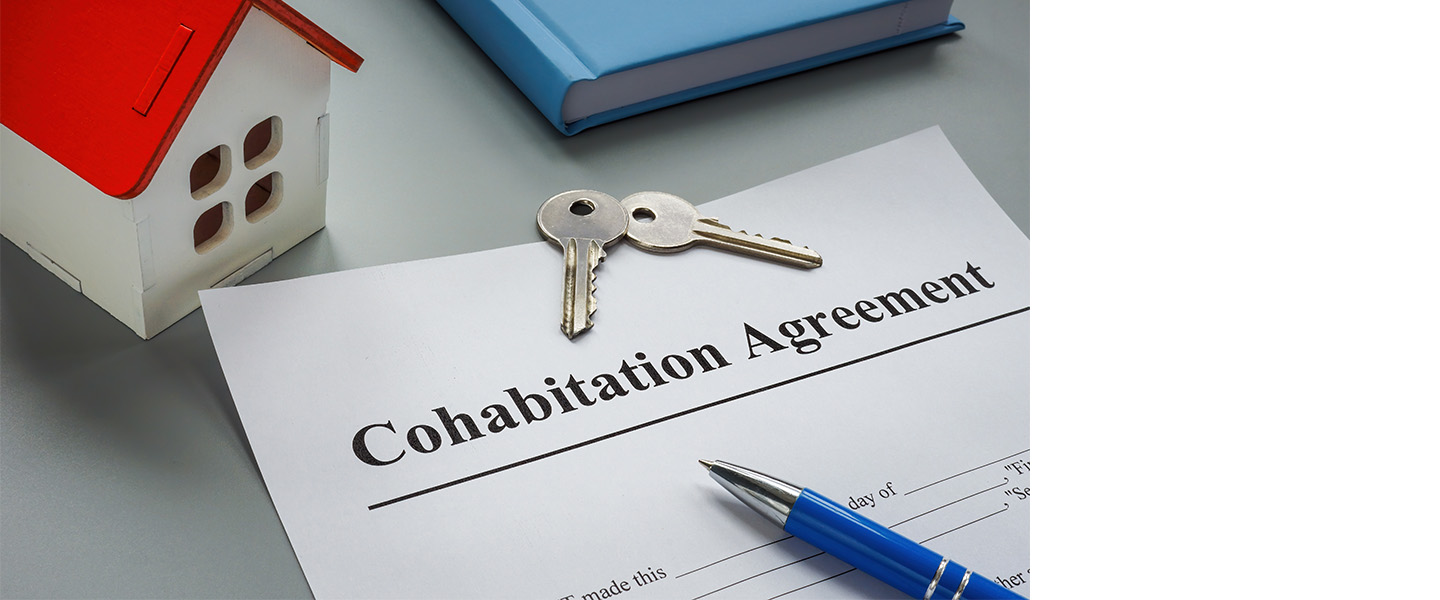Wondering about your rights when living together?
There’s a common misconception that after a few years of cohabiting, you get the same rights as married couples. But the truth is, if you’re not married or in a civil partnership, things can get complicated when it comes to property and money if you decide to part ways.
Even if you share a home and have similar incomes, splitting up can be complex. That’s why our experienced family lawyers suggest that couples who live together without getting married should think about creating a cohabitation agreement early on.
What is a cohabitation agreement and how can Sinclair Law Solicitors help you?
It’s like a plan for what happens to your belongings and money if you break up. For example, one of you might own the place you live in and have money saved up, while the other doesn’t.
Imagine you’ve been together for a long time, sharing bills and expenses, but if you split up later in life, one of you could end up in an insecure position. Or, if you own a home, you’d want to make sure it’s protected even if the relationship only lasts a few years.
So, if you would rather not get married but want to make sure your relationship is on solid ground, why not chat with one of our friendly family lawyers? They can explain how a cohabitation agreement can protect your assets and help make things fair and clear for both of you.
Why use Sinclair Law Solicitors
- Free 30-minute consultation so we can get to know you and your individual situation
- Jargon-free friendly service
- An expert solicitor by your side helping you through every step of the process
- Our legal service costs are unrivalled by many larger law firms in South Manchester and Cheshire
- Transparent pricing with no nasty surprises
- Authorised and regulated by the Solicitors Regulation Authority
- Rated ‘Excellent’ by our clients on Google and Review Solicitors

What our clients tell us
Commonly asked questions about cohabitation agreements
- What can a Cohabitation Agreement cover?
- What are the advantages of a Cohabitation Agreement?
- What are the disadvantages of a Cohabitation Agreement?
- Will a Cohabitation Agreement have any effect if we later get married?
- When should we sign up to a Cohabitation Agreement?
- What legal status does a common law spouse have?
- Is the legal position on cohabitation likely to change?
What can a Cohabitation Agreement cover?
Where property is co-owned by two or more cohabitees, a Cohabitation Agreement can avoid the cost of litigation about the party’s respective beneficial interests in the home that they shared when cohabitation ended.
It can also be used to record ownership of personal property eg: cars, furniture, etc. (which may be used or enjoyed by both cohabitees when they live together but are to be retained by the owner if cohabitation ends).
What are the advantages of a Cohabitation Agreement?
These type of agreements are a helpful way of recording the couple’s intentions about legal and beneficial ownership of their real and personal property when they decide to live together.
Formal cohabitees can often spend vast sums of money on litigation to determine their respective shares in property.
Recording this from the outset in clear and certain terms avoids uncertain litigation at some stage in the future.
They are also a way of providing the couple with their own flexibility and freedom to organise their financial affairs as they wish both during and following cohabitation.
They are also a useful way of ring fencing assets that are introduced by one of the couples through for example gifts or loans from their parents.
What are the disadvantages of a Cohabitation Agreement?
To ensure that the Cohabitation Agreement will be enforceable as a contract it is essential to follow some simple but important rules to avoid claims such as fraud, duress or illegality on some other grounds.
To ensure that your Cohabitation Agreement does not fall foul of these rules please speak to us.
There will necessarily be a cost involved in ensuring that your Cohabitation Agreement is properly drawn up but the best way to think about this is to regard it as your insurance policy for the future to avoid uncertainty and expensive litigation.
Will a Cohabitation Agreement have any effect if we later get married?
In these circumstances our advice would be to replace your Cohabitation Agreement with a Pre Nuptial Agreement. Please refer to our in-depth guide on Pre Nuptial Agreements.
When should we sign up to a Cohabitation Agreement?
There is no set rule as to when you should enter into an Agreement.
However it is advisable that if you intend to purchase a property jointly that you have the Agreement in place at the time of or prior to completion of your purchase.
It is better to have an Agreement clearly recording the intentions of both of you at the outset.
However the Agreement can be signed even after cohabitation has begun though of course there may be less compulsion for that to happen once you are safely ensconced in your new home!
Whilst timing is therefore not critical (though it is always preferable) it is more important to ensure that the Agreement is not signed at a time when either party might suggest that they were in a vulnerable position which was somehow exploited by the other party exerting undue pressure.
The effect of this could be to render the Agreement voidable.
What legal status does a common law spouse have?
The term “common law” husband or wife is not a status that is recognised by the law in England and Wales.
Only marriage (or civil partnership) confers legal status. Having said that, if the period of cohabitation exceeds two years a cohabitee may have the right to claim upon the estate of a deceased cohabitee who died post 2 years cohabitation.
Is the legal position on cohabitation likely to change?
The law in this area is constantly under review.
The latest publication by the Law Commission entitled “Common Law Marriage and Cohabitation” was published on the 9th February 2016. This briefing paper includes information on:-
- The lack of legal status for cohabiting couples regardless of time, property or family;
- Statistics about cohabiting families in the UK
- Legal rights of cohabiting couples under current law
- Cohabitation Agreements and what they provide
- Proposals for reform suggested by the Law Commission including financial relief, government responses and inheritance.

Request your free 30-minute consultation
Expert family law advice in Cheshire & South Manchester
Meet our team








